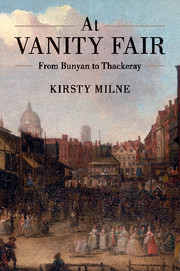
- Cited by 5
-
Cited byCrossref Citations
This Book has been cited by the following publications. This list is generated based on data provided by Crossref.
Slegers, Rosa 2018. Adam Smith’s Moral Sentiments in Vanity Fair. Vol. 49, Issue. , p. 15.
Slegers, Rosa 2018. Adam Smith’s Moral Sentiments in Vanity Fair. Vol. 49, Issue. , p. 1.
Draycott, Andy 2020. Evangelical Devotionals and Bible Studies of The Pilgrim’s Progress: Fidelity or Bibliolatry?. Christian Education Journal: Research on Educational Ministry, Vol. 17, Issue. 2, p. 264.
Draycott, Andy 2021. Pilgrim’s missionary progress: Contemporary evangelistic adaptations of John Bunyan’s lingering spiritual classic for a post-secular West. Missiology: An International Review, Vol. 49, Issue. 2, p. 149.
Kolding, Isaac 2024. John Bunyan in Abolitionist Print Culture. American Literature, Vol. 96, Issue. 1, p. 29.
- Publisher:
- Cambridge University Press
- Online publication date:
- May 2015
- Print publication year:
- 2015
- Online ISBN:
- 9781316226551




